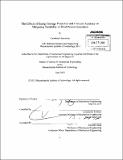The effects of energy storage properties and forecast accuracy on mitigating variability in wind power generation
Author(s)
Jaworsky, Christina A
DownloadFull printable version (5.948Mb)
Other Contributors
Massachusetts Institute of Technology. Department of Mechanical Engineering.
Advisor
Konstantin Turitsyn.
Terms of use
Metadata
Show full item recordAbstract
Electricity generation from wind power is increasing worldwide. Wind power can offset traditional fossil fuel generators which is beneficial to the environment. However, wind generation is unpredictable. Wind speeds have minute to minute variability which causes minute to minute generation to fluctuate. Additionally, wind forecasting does not perfectly predict wind generation, so it is difficult for wind to meet a generation schedule. Therefore, with increased wind production, there is a need for flexibility in the electricity grid. Electricity storage is one method of achieving greater flexibility. With storage, wind generators can have a less variable power output. They can also be made to follow a generation schedule the same way traditional generation does. This study discusses the storage requirements for reducing the variability of wind power. It also assesses the value of an accurate forecast in terms of storage requirements. Storage capacity requirements are shown to be modest compared to the size of a generator, representing approximately one minute of full power generation capacity. Accurate forecasting can reduce the storage requirements of a wind generator. However, forecasts have little added value for greater accuracy beyond correctly predicting the mean of the wind generation on delivery scheduling intervals.
Description
Thesis (S.M.)--Massachusetts Institute of Technology, Dept. of Mechanical Engineering, 2013. Cataloged from PDF version of thesis. Includes bibliographical references (p. 84-87).
Date issued
2013Department
Massachusetts Institute of Technology. Department of Mechanical EngineeringPublisher
Massachusetts Institute of Technology
Keywords
Mechanical Engineering.